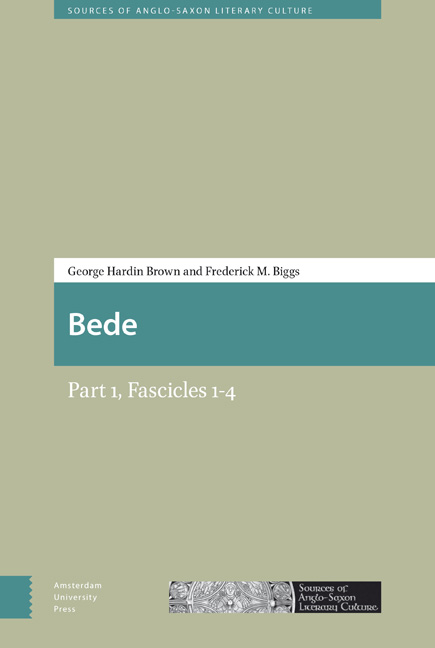Poetry: Hymns
Published online by Cambridge University Press: 02 February 2021
Summary
From the list of his works at the end of the HISTORIA ECCLESIASTICA GENTIS ANGLORUM(ed. Lapidge 2010 2.484; trans. Colgrave and Mynors 1969 p 571), it is certain that Bede not only wrote hymns, but also gathered them together into a volume since he includes “librum hymnorum diuerso metro siue rythmo” (“a book of hymns in various metres and rhythms”). The collection as a whole has not survived, making it more difficult at times to distinguish between Bede's hymns and his other short poems gathered in POETRY: EPIGRAMS. Indeed only one hymn, ALMA DEUS TRINITAS QUAE SAECULA CUNCTA GUBERNAS, on St Athelthryth (see ÆTHELDRYTHAin ACTA SANCTORUM) is certainly both by Bede and a hymn since he tells us so in the Ecclesiastical History and then quotes it in its entirety. A second hymn, PRIMO DEUS CAELI GLOBUM, is introduced as his in an early ninth-century manuscript from Koln (Cologne). Moreover, this hymn is one of eleven in quantitative verse ascribed to Bede in the sixteenth-century edition of Georg Cassander (1556); for reasons that will be discussed in a moment, all are accepted as genuine. In addition, Michael Lapidge (2008a p 130) considers the attribution to Bede as “plausible” in the case of two rhythmical hymns about the Last Judgement, APPAREBUNT ANTE SUMMUM SAECULORUM IUDICEMand APPAREBIT REPENTINA DIES MAGNA DOMINI. These fourteen hymns will be considered here in the alphabetical order of their incipits. In contrast, Bede's metrical paraphrases of Psalms 41 and 112, considered by M.L.W. Laistner (1943 p 124) as hymns, are discussed with the epigrams.
The attribution of some of Cassander's hymns to Bede was placed on much firmer ground by Guido M. Dreves's (1907 pp 97-98) discovery of ALCUIN's DE LAUDE DEI, an as yet unpublished collection of devotional readings compiled while the author was in York and surviving in two manuscripts, one in Bamberg and the other in the Escorial (see Lapidge 1996b p 326 note 61; CSLMA Auctores Galliae 735-987 pp 140-41; and Ganz 2004). Prior to Dreves's find, there appeared to be no way to evaluate Cassander's attributions. The section in the Bamberg manuscript entitled De hymnis contains extracts that, although anonymous, allow the identification of eight of the hymns printed by Cassander as very likely by Bede.
- Type
- Chapter
- Information
- BedePart 1, Fascicles 1-4, pp. 241 - 262Publisher: Amsterdam University PressPrint publication year: 2017



